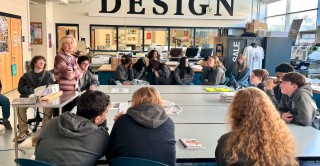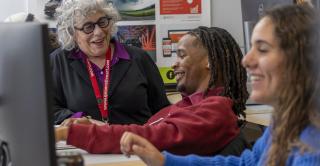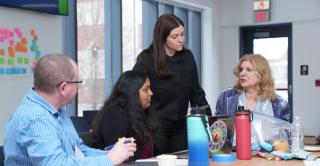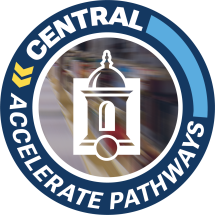
Central to Designing Powerful Machines.
Central's Bachelor of Science program in Mechanical Engineering equips its graduates with a comprehensive education, fostering a well-rounded skill set encompassing analytical and experimental proficiencies. This program effectively prepares students to cultivate specialized expertise and gain the requisite experience to embark on a career in diverse industry roles or pursue advanced studies.
The program has been thoughtfully structured with two distinct areas of concentration under the broader mechanical engineering degree. Students can choose between a manufacturing or aerospace focus by selecting specific elective courses. The manufacturing concentration leverages the School of Engineering Science and Technology's established strength in this domain, while the aerospace concentration aligns with the state and regional industry requirements. This concentration feature empowers students to tailor their educational path to meet individual aspirations and adapt to the evolving demands of potential employers in both the state and the region.
The Mechanical Engineering program integrates personal mastery of core subjects such as fluid mechanics, thermal engineering, mechanical systems, and solid mechanics with collaborative, solution-driven approaches to open-ended design challenges, hands-on practical experiences, and experimental techniques. Students develop the skills needed to transform concepts into tangible products.
One defining element of the undergraduate experience in mechanical engineering at Central is the design program, an integral component of the curriculum that combines fundamental instruction in design with practical involvement in design-build-test projects. A sequence of two design-intensive courses culminates in a capstone course.
Another distinctive feature of the program is the mandatory 400-hour practical training course. This field training, conducted under the supervision of qualified engineering practitioners, allows students to apply the knowledge acquired in prior coursework to real-world applications. This experience enhances their professional and interpersonal skills, preparing them for employment in their chosen fields upon graduation.
A third special feature of the program is the option for a 5-year accelerated BS/MS in Mechanical Engineering, which enables students to earn both degrees in 149 credits instead of the traditional 158, resulting in time and cost savings.
Program Features
- A flexible program designed to cater to individual goals, interests, and the dynamic industry landscape.
- Graduates are well-regarded practicing engineers in the field.
- A third special feature of the program is the option for a 5-year accelerated BS/MS in Mechanical Engineering, which enables students to earn both degrees in 149 credits instead of the traditional 158, resulting in time and cost savings.
- Access to cutting-edge labs and advanced technologies.
- The option to pursue the program on a full- or part-time basis.
- An opportunity for a 5-year accelerated BS/MS in Mechanical Engineering, providing significant time and cost savings.
- Internship and career development opportunities.
- Availability of financial aid and scholarships.

The Mechanical Engineering Program is accredited by the Engineering Accreditation Commission of ABET.
Mission Statement
The mission of the mechanical engineering program is to deliver and maintain a high-quality, state-of-the-art education in mechanical engineering, enabling students to acquire the specialized knowledge and experience necessary to practice as professional mechanical engineers or to pursue advanced analytical studies. The program welcomes aspiring engineering students by offering fundamental core and advanced engineering courses, facilitating their exploration of the field.
Vision Statement
An accredited program in mechanical engineering will serve the state and region by providing a quality engineering education that enables students to achieve excellence in their field of study.




